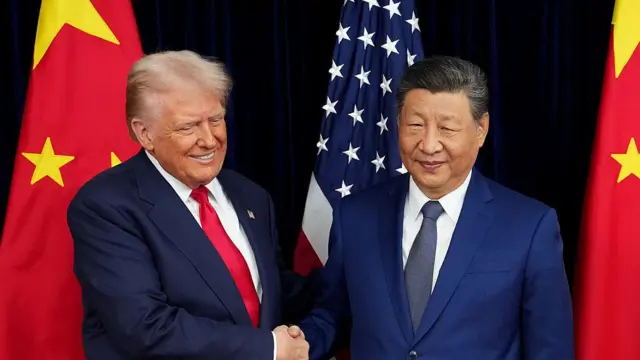Brazil's Agriculture Disrupts Trump’s Plans
Publicado em 06/11/2025
Divulgação Donald Trump and Xi Jinping, Presidents of the U.S. and China
Donald Trump and Xi Jinping, Presidents of the U.S. and China
Published on November 3, 2025
Agriconscient Show – Broadcast by Radio Eldorado/Estadão – Brazil
*José Luiz Tejon
Translated/Copyedited by Teacher Francisco Barbosa Bardhal
Imagine if Brazil were unable to supply around 112 million tons of soybeans to China in the 2025/26 cycle, while the United States Department of Agriculture (USDA) projects only 47 million tons “if all goes well” for them.
Bear in mind how China would have retaliated against the U.S. in the food sector by not purchasing a single grain of soybeans so far, imposing a 20% tariff on soybeans, cotton, sorghum, poultry, pork, milk, and dairy products. We would witness the U.S. using an “iron fist” over China, as the food game is merciless. This isn´t a new phenomenon in human history, as food embargoes have always been used as a weapon of war.
Thus, despite agreements concerning Chinese restrictions on rare earth export, the one-year extension of U.S. controls on technology exports to Chinese subsidiaries; the import of American energy by China and the suspension of port fees by the U.S. and China for one year, Trump, “the unreliable,” hasn´t succeeded in bringing Xi Jinping to his knees due to the scale of Brazil's agricultural achievements over the last 50 years - Brazil remains the only country in the world capable of more than doubling its agricultural output in the next 15 years.
This implies that, at a critical moment for the nation, the largest commercial agriculture in the world, American agriculture, could harness its power against China, the world’s biggest food importer, but is unable to fully utilize this “weapon” as it potentially once could.
"In this context, many may overlook a subtle point: Brazilian agriculture acts as a peacekeeping weapon in the food cold war.
I reiterate what the former Minister of Agriculture has long asserted, Mr Roberto Rodrigues’ slogan:
“Brazil, the country of Peace; food is Peace.”
The real concern for Brazil lies in the vile and malicious attacks against Brazilian agriculture by Trump’s administration, which would allow for a wave of misinformation and fake news linking Brazilian soybeans and animal protein to deforestation issues.
In a conflict centered on global consumer perceptions, this could trigger a rejection of Brazilian agricultural exports, benefiting our main agricultural competitor, the United States.
At the “meeting” between China and the United States, what Trump achieved was a regression to a situation already unfavourable to Americans, a return to the recent past. The volumes presented in the “agreement” expose those that existed before the tariff cold war involving soybeans.
In 2024/25, the United States sold 22.6 million tons to China. In 2023/24, their sales totalled 25 million tons, exactly the same combined now in the “agreement.”
However, those who purchase soybeans for agro-industrial processing appreciate the idea of buying soybeans at lower prices. Therefore, understandably, with news of the “agreement,” even though it’s scarce in terms of soybeans, we observe movements reducing prices in the markets.
Thus, it´s up to the “sellers,” the rural producers, not to get caught up in the “market stress,” and it increasingly falls upon Brazil to urgently develop a strategic plan in a world that will become increasingly dependent on food and bioenergy security, where Brazil has emerged as a powerhouse that disrupts the dynamics of food cold wars and commercial battles among the holders of the largest GDPs in the world: the United States, China, and the European Union.
The negotiation of the scandalous 50% tariff on Brazilian products will be subject to revisions and favorable signals, as undoubtedly, Trump, a player in the global casino, far above and beyond, merely throwing " charming and affection ” over Presidente Lula, has understood that it´s crucial to engage Brazil, not just for Brazil itself, but for the strategic agriculture/food and bioenergy powerhouse we have silently become over the past 50 years.
As Sir Winston Churchill said during World War II:
“Never have so many owed so much to so few.”
The Brazilian Tropical Creative Revolution has its heroes, scientific champions, producers, and growers of courage and resilience, advancing through the Cerrado, entrepreneurship, and cooperativism
Today Brazil is the world’s fourth-largest grain producer, a position we expect to surpass within the next 15 years to become the undisputed global leader.
As the late Minister Alysson Paolinelli once stated:
“What has brought the world this far has been temperate climate agriculture; from now on, it will be tropical agriculture.”
The world has changed. Brazil's agriculture disrupts all of Trump’s plans in the trade war. With Brazilian agriculture, global food security has grown.
But undoubtedly, the private positive initiatives of the United States and Brazil, combined with the intelligence of diplomacy and transcending ideological egos, will prevail.
*Prof.Dr.José Luiz Tejon - PhD in Education Universidad de La Empresa/Uruguay; Academic Director Brazil+Tropical Belt Nations at International Agribusiness MBA Audencia France & Fecap Brazil; Master's degree in Art Education and History of Culture - Mackenzie University; Journalist and Publicist - Harvard, MIT and PACE/USA/ Insead in France; Specialization Academic Coordinator of Master's Science Food & Agribusiness Management at Audencia in Nantes/ France, and FECAP/Brazil; Managing Partner at Biomarketing and TCA International; Professional Head at Agri Anefac; Writer, author and co-author of 37 books; Agri Personality Award 2023/ABAG -100 Most Influential People in Agribusiness; Former director of Grupo Estadão, Agroceres and Jacto S/A; 2025 Award Agriworld Group.
